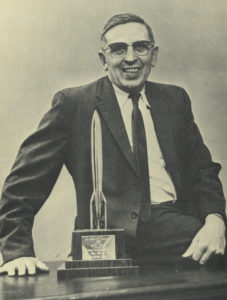Today, October 15, marks two more birthdays. James Schmitz (1911-1981) and E. C. Tubb (1919-2010). Continue reading
Category Archives: birthday
Frank Herbert at 98
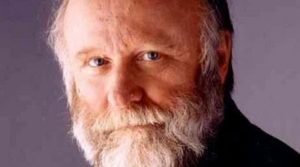 Frank Herbert was born on this date, October 8, in 1920. He passed away in 1986.
Frank Herbert was born on this date, October 8, in 1920. He passed away in 1986.
Herbert was the author of Dune and a number of sequels. (Note to self: reread Dune and read the sequels written by Herbert.)
But he wrote a number of other novels, including The Santaroga Barrier, The Dosadi Experiment, and Under Pressure, to name a few. His collected short fiction was published about five or six years ago.
Today, though, Herbert is remembered primarily for Dune. I suspect that’s because Brian Herbert and Kevin J. Anderson have turned it into a franchise.
The influence of Dune cannot be overstated. If it’s been out of print since it was first published, I’m not aware of it. The book is rightly considered a classic.
Herbert should be remembered for the other work he did, though. I’ve only read a few of his other books, and those were years ago. I enjoyed them and have several novels of his novels that I haven’t read sitting on the shelves.
In honor of Herbert’s birthday, I’ll try to read a short story this evening. I’ve been reading some older science fiction over the last few months, although I’ve not blogged about any of it. I’ll try to include one of Herbert’s novels in the mix.
Happy Birthday, Clifford D. Simak
Cifford D. Simak was born on this date, August 3, in 1904. He passed away in April of 1988.
Simak was one of the great science fiction writers of the Twentieth Century. Among his awards were three Hugos (“The Big Front Yard”, Way Station, “Grotto of the Dancing Deer”) and a Nebula (“Grotto of the Dancing Deer”). He was the third SFWA Grandmaster after Robert Heinlein and Jack Williamson. Simak, Fritz Leiber, and Frank Belknap Long were all awarded the inaugural Bram Stoker Award for Lifetime Achievement. Not too shabby.
Simak has frequently been called the pastoralist of science fiction. Many of his works are set in rural areas of his home state of Wisconsin. Robots, time travel, and the nature of God were often themes in his work. Although he is best remembered as a science fiction author, Simak also wrote fantasy, westerns, and war stories. A newspaper man by trade, Simak also wrote a handful of science books in the 60s and early 70s.
Unfortunately, as often happens these when a writer dies, his work soon fell out of print. For years the only place to buy his work was in used books stores. I’m glad to say that isn’t the case anymore. Open Road is bringing back all of Simak’s work, including his complete short fiction. Early Bird books often has electronic editions on sale for $1.99. You have to act fast, though. These sales only last 24 hours.
If you’ve not read Simak, you should give him a try. I’ll be lifting a glass in his memory and reading one of his short stories
An Observance of C. M. Kornbluth’s Birthday
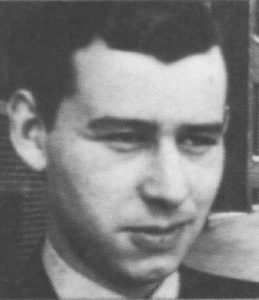 Ninety-five years ago today, on July 23, 1923, Cyril Kornbluth was born in New York City. The middle initial was added later. Although he has faded into relative obscurity today, Kornbluth was one of the best science fiction writers of the 1950’s. He died on March 12, 1958 of a heart attack. He was on his way to an interview with Robert P. Mills for the editorship of The Magazine of Fantasy and Science Fiction.
Ninety-five years ago today, on July 23, 1923, Cyril Kornbluth was born in New York City. The middle initial was added later. Although he has faded into relative obscurity today, Kornbluth was one of the best science fiction writers of the 1950’s. He died on March 12, 1958 of a heart attack. He was on his way to an interview with Robert P. Mills for the editorship of The Magazine of Fantasy and Science Fiction.
Kornbluth was primarily a writer of short fiction. He only wrote a handful of solo novels. The rest of his novels were collaborations with Judith Merrill and Frederik Pohl. His most famous collaboration with Pohl was The Space Merchants. While he also wrote at least a book’s length worth of short stories in collaboration with Pohl, the bulk of his short work wasn’t collaborative. Pohl and Kornbluth were founding members of the famed (and infamous) Futurians.
Kornbluth’s work is marked by a bitter cynicism and often contained some pretty dark satire. (Maybe that’s why he appealed to me when I encountered it as a teenager.) His most famous stories are “The Little Black Bag”, which resembles Kuttner and Moore’s “Mimsy Were the Borogoves” in that an object from the future is sent back into the past (our present), and its sequel “The Marching Morons”. The latter takes place in a future where a few elite control a population of morons, and there are no common characters between the two stories. “The Marching Morons” is as relevant today as it was when it was written.
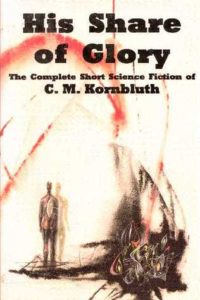 NESFA Press collected all Kornbluth’s short fiction in His Share of Glory. It’s also available in an audiobook. I read it years ago; it’s due to be dusted off and read again. I’ll try to take a closer look at one of his stories later this week. There are some gems in this collection. Kornbluth needs to be more widely read.
NESFA Press collected all Kornbluth’s short fiction in His Share of Glory. It’s also available in an audiobook. I read it years ago; it’s due to be dusted off and read again. I’ll try to take a closer look at one of his stories later this week. There are some gems in this collection. Kornbluth needs to be more widely read.
Some Thoughts on National Science Fiction Day and Isaac Asimov’s Birthday
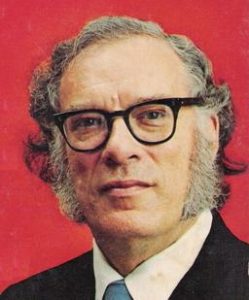 Today is January 2, the accepted day on which Isaac Asimov is considered to have been born in 1920. It’s also National Science Fiction Day here in the States.
Today is January 2, the accepted day on which Isaac Asimov is considered to have been born in 1920. It’s also National Science Fiction Day here in the States.
I’d forgotten today was National Science Fiction Day. Probably because I haven’t been paying attention.
I wrote yesterday that I intended to read more science fiction this year. My imagination was captured by science fiction almost as soon as I could read, if not before. We had a couple of books about rockets and space exploration. Some of my earliest memories are my parents reading them to me. I don’t recall if they were reprints of some articles Willy Ley wrote or not. I remember they were heavily illustrated. Not surprising since they were for kids.
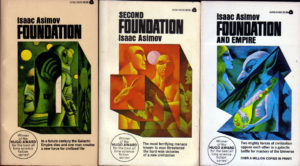 Star Wars was what really kindled my imagination, sending me to look for science fiction at both the school library and the public library. I remember the main branch of the Wichita Falls library had an entire shelf, maybe two, in the adult section for their science fiction books. And I also bought science fiction at the mall and the flea market.
Star Wars was what really kindled my imagination, sending me to look for science fiction at both the school library and the public library. I remember the main branch of the Wichita Falls library had an entire shelf, maybe two, in the adult section for their science fiction books. And I also bought science fiction at the mall and the flea market.
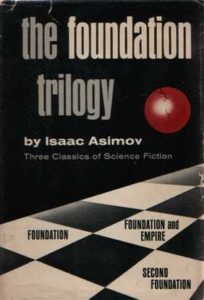 Soon I was reading Ray Bradbury, Alan Dean Foster, Jack Williamson, and of course Isaac Asimov. I’d seen a copy of The Foundation Trilogy on that shelf in the public library but I hadn’t checked it out. I didn’t have any idea what it was about, and the paperbacks that were in print at the time (shown above) weren’t very informative.
Soon I was reading Ray Bradbury, Alan Dean Foster, Jack Williamson, and of course Isaac Asimov. I’d seen a copy of The Foundation Trilogy on that shelf in the public library but I hadn’t checked it out. I didn’t have any idea what it was about, and the paperbacks that were in print at the time (shown above) weren’t very informative.
Fast forward a couple of years to when I was in middle school and joined the Science Fiction Book Club. One of the books I got with my introductory order was the club’s edition of The Foundation Trilogy, shown on the left. The cover wasn’t anymore informative as to what the story was about than the paperbacks. I didn’t care. By that time I’d read I, Robot and some of Asimov’s other short stories in some of the anthologies in the school library.
I dove in and enjoyed the original three novels. A few years later, when Asimov wrote some additional volumes and tied them into the robot stories, I read those as well, although I didn’t enjoy them as much.
I’m probably not going to read any of Asimov’s short fiction as a birthday observance. Instead I’m going to honor his memory by writing. Asimov wrote literally hundreds of books in his lifetime. I doubt my output will ever be anything close to his, but I still need to write. This blog post has been a good warm-up.
As for reading Asimov, should The Foundation Trilogy be one of the works I revisit this year? Or should I read some of the robot stories or other short fiction? Maybe a novel of his I haven’t read? There are several of them, such as The Gods Themselves and The Currents of Space. What do ya’ll think?
Robots for Asimov
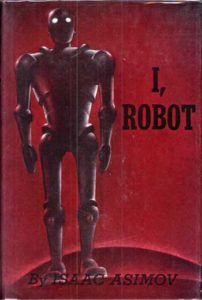 I apologize for the campaign-esque sound of the title. I’m still trying to get 2016 out of my head. Anyway, I said yesterday at Adventures Fantastic that I’m going to be reading more of the classics of the field. Furthermore I specifically named Asimov’s robot stories as one of the things I’ll be reading.
I apologize for the campaign-esque sound of the title. I’m still trying to get 2016 out of my head. Anyway, I said yesterday at Adventures Fantastic that I’m going to be reading more of the classics of the field. Furthermore I specifically named Asimov’s robot stories as one of the things I’ll be reading.
It’s Asimov’s 97th birthday today. He was born January 2, 1920, in Russia. I first read the robot stories in 7th grade. It’s been more than a decade (going on two decades now) since I last read one of them. I’ve read a few Asimov stories over the past year; I’m about a third of the way through The Winds of Change right now.
The robot stories have all been collected in The Complete Robot. I’ve got a copy around somewhere, if I an ever find the darn thing. I’m looking forward to diving into them. Robots used to be pretty ubiquitous in science fiction, but you don’t see them that much these days. They’ve been supplanted by AIs. Still, I like the old-fashioned robots, and Asimov did them better than anyone.
Alfred Bester and “Fondly Fahrenheit”
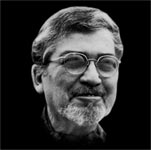 Alfred Bester was born on this date (December 28) in 1913 in New York City. He was in many ways one of the most brilliant and innovative science fiction writers of the 20th Century, having an influence that was disproportionate to his output. His novel The Demolished Man won the first Hugo Award for Best Novel. Dealing with telepathy, it was a wild and stylistically innovative book. The Psy-Corps in Babylon 5 was modeled after portions of this novel, and Walter Koenig’s character in the show was named Alfred Bester, an obvious homage. Continue reading
Alfred Bester was born on this date (December 28) in 1913 in New York City. He was in many ways one of the most brilliant and innovative science fiction writers of the 20th Century, having an influence that was disproportionate to his output. His novel The Demolished Man won the first Hugo Award for Best Novel. Dealing with telepathy, it was a wild and stylistically innovative book. The Psy-Corps in Babylon 5 was modeled after portions of this novel, and Walter Koenig’s character in the show was named Alfred Bester, an obvious homage. Continue reading
Cordwainer Smith at 113
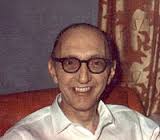 This is going to be a quick post, because the second summer term starts in the morning, and I’m teaching an 8:00 AM class I’m still doing last minute preparations for. However, I would be remiss if I didn’t point out that Paul Myron Anthony Linebarger, who wrote science fiction under the pen name of Cordwainer Smith.
This is going to be a quick post, because the second summer term starts in the morning, and I’m teaching an 8:00 AM class I’m still doing last minute preparations for. However, I would be remiss if I didn’t point out that Paul Myron Anthony Linebarger, who wrote science fiction under the pen name of Cordwainer Smith.
If you haven’t read him, you’ve missed one of the most unique voices the field has ever seen. Much like Avram Davidson and R. A. Lafferty, no one has ever really written like him. (Although the first part of Robert Silverberg’s Nightwings comes close.) And he is nothing like Lafferty or Davidson.
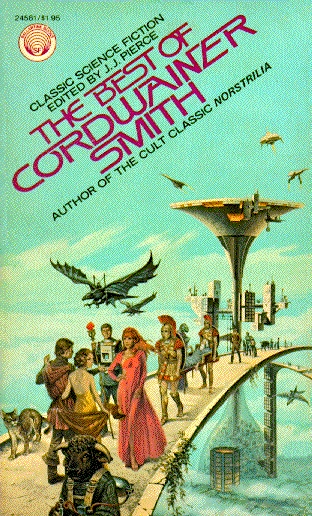 Born in 1913, he was an expert on East Asia and psychological warfare and spoke at least six languages. His future history, The Instrumentality of Mankind, contains a number of unique terms Linebarger created just for his fiction. His works contain a greater depth than most fiction of the 1950s and early 1960s. Many of his stories have religious overtones, and he’s been compared to Tolkien and Lewis.
Born in 1913, he was an expert on East Asia and psychological warfare and spoke at least six languages. His future history, The Instrumentality of Mankind, contains a number of unique terms Linebarger created just for his fiction. His works contain a greater depth than most fiction of the 1950s and early 1960s. Many of his stories have religious overtones, and he’s been compared to Tolkien and Lewis.
Linebarger/Smith suffered a fatal heart attack in 1966. His daughter maintains a detailed webpage about him here.
Happy Birthday, Harlan Ellison
Harlan Ellison was born today in Cleveland, Ohio on this day in 1934. I’d like to wish him a Happy Birthday.
Ellison is a writer’s writer. He’s best known as a science fiction writer (although fantasist is a better term), but he’s written in multiple genres. His works include mystery, mainstream, screenplays, teleplays, and essays. It’s hard to point to something representative of his work because is oeuvre is so varied. There are the classic stories such as “The Deathbird”, “I Have No Mouth and I Must Scream”, “Jeffty is Five”, and so many more. There are the essays in The Glass Teat, The Other Glass Teat, and Harlan Ellison’s Watching.
If you’ve not read him, give him a try. Then give him another try, because chances are good that the second thing you read by him won’t be anything like the first.
Anyway, Happy Birthday, Harlan!

